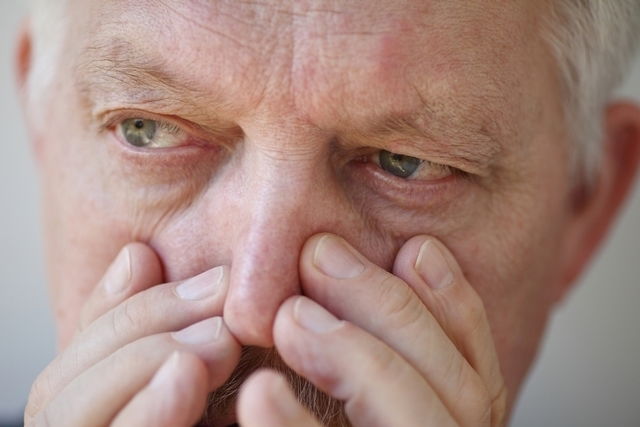Sinusitis can occur many times along a lifetime for many reasons such as a viral infection or allergies. Symptoms associated with a sinus infection are uncomfortable and can include headaches, facial pain, nasal congestion or fever over 38º C (or 100.4º F).
To cure sinusitis quickly, you should eliminate whatever is triggering the inflammation.
Check out our tips on how you can relieve symptoms of a sinus infection easily at home:

1. Moisturizing the air
Using a humidifier, or simply placing a bowl of warm water in different rooms of your home, is an excellent way to moisturize the air so that it is not as dry. This can hydrate the respiratory airways and relieve irritation, which reduces discomfort and helps speed-up recovery.
This tip is especially useful to use at night, to help with sleep and to avoid waking up with a stuffy nose. Learn about the other symptoms that can occur with a sinus infection.
2. Saline drops
Placing some drops of saline in each nostril can help to clear debris in the nasal passages and help to eliminate any accumulated discharge. Saline moistens secretions, making it easier to be removed. Ideally, you should not inhale the saline, and you should blow your nose immediately after irrigation.
You can make saline at home by mixing 1 tablespoon of salt into filtered water or mineral water, making sure to stir until the salt has dissolved.
3. Nasal irrigation
Using the saline made above, you can perform a nasal irrigation at home to clear out discharge and debris and help with unplugging your nose. Draw the saline solution into a syringe (without a needle) and squirt the solution inside one nostril, keeping your mouth open. The solution should exit from the other nostril.
4. Inhaling aromatic vapors
Placing chamomile or eucalyptus leaves or flowers in a bowl of hot water is an excellent way to relieve congestion caused by a sinus infection. You can additionally place a moist, warm towel over your face after you are done inhaling to help improve respiration. Check out our article on how to prepare a eucalyptus inhalation to relieve your symptoms, as well as other home remedies you can try.
5. Increase water intake
A natural way to moisturize the sinus cavities is to drink more fluids, mainly water or unsweetened teas. This will help to keep all body tissue hydrated, including the mucus lining of the nose.
6. Eat warm meals
Soups and broths are great options for lunch and dinner when you have symptoms of a sinus infection. These dishes help to unplug the nose and decrease pain or irritation in the nasal lining.
7. Adequate rest
During a sinusitis flare-up, you are advised to rest as much as possible. Going to sleep late and waking up tired may be signs that you are not getting enough rest.
If you are receiving active treatment for a sinus infection, you should avoid physical activity or intense workouts. 20 minute walks may be beneficial in a well-ventilated, open-air place, however it may be ill-advised if your sinusitis is caused by seasonal allergies.
When to take medication
Nasal decongestants or antihistamines may be recommended for 7 to 10 days if you are unable to manage your sinusitis with at-home remedies.
Your doctor may also prescribe steroids, anti-inflammatories or antibiotics for 5 to 7 days, depending on the presenting symptoms (like fever), the severity, or health history (e.g. a history of asthma, or other respiratory illness).
What can cause chronic sinusitis
Although in most cases, sinus infections resolve after treatment and may not return for a long time, some people have chronic sinusitis. This means they experience sinus inflammation several times a year and their symptoms persist for much longer. Generally, this type of sinusitis is triggered by causes that are not easily eliminated, resulting in constant irritation of the nasal cavities.
The main causes of chronic sinusitis are:
- Respiratory allergies, like allergies to pet fur or dust
- Cigarette smoke
- Autoimmune disease that weaken the immune system
In addition, some people may have nasal polyps or other anatomic abnormalities that may facilitate the development of sinusitis. in these cases, the doctor may recommend surgery to resolve the problem, which may end up curing it altogether. Surgery does not, however, prevent sinusitis that occurs due to problems like allergies or viral infection.
How to treat chronic sinusitis
In most cases of chronic sinusitis, medications as well as lifestyle changes are necessary to avoid the triggers that lead to sinus inflammation. These behaviors may include smoking cessation, avoiding polluted areas, and keeping your home clean and free of dust.






























